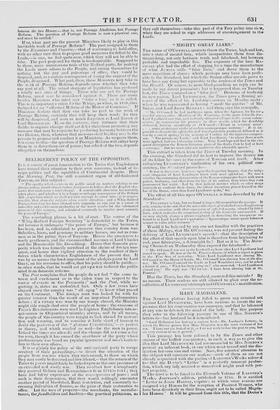BELLIGERENT POLICY OF THE OPPOSITION.
IT is a source of great lamentation to the Tories that Englishmen have turned their attention to their own concerns, instead of fo- reign polities and the squabbles of Continental despots. Hear the Morning. Post, the still consistent organ of old-fashioned Toryism, on this subject- " The apathy Otitis exists in the public mind on matters relating to our foreign pilaw, would almost induce faeigners to bdiere that the English cha- racter had undergone a total change. A considerable alteration has certainly taken place; and whether it he a happy or unhappy consequence of the Reform Bill—a question which we shall not now attempt to enter into—it is mopes- tionab'e, that domestic sulj vets abate excite altentitm ; and a Whig-Radical Foreign Secretary has been allowed with impunity to run riot in a career of imbecility and recklessness productive of the worst results for the substantial interests of this country, and calculated eventually to involve most seriously the pace of Europe."
The concluding phrase is a bit of cant. The course of the " Whig-Radical Foreign Secretary" is distasteful to the Tories, not because it endangers " the peace of Europe," but because it has been, and is, calculated to preserve this country from war. Subsidies, loans, and pensions to military heroes, are not as com- mon as in the palmy days of Toryism. Hence the annoyance to needy gentlemen, and the circumscribed incomes of Lord Charles and the Houton able Mr. Du-nothing. Ilence that domestic pros- perity which was formerly sacrificed at the shrine of foreign con- quest, and hence that vigilant attention to the conduct of their rulers which characterizes Englishmen of the present day. It was by nu means the least important of the pledges given by Lord GREY, on his accession to office, that his policy should be pacific,— in other words, that he would not get up a war to divert the public mind from domestic reforms.
The Post complains that the people do not feel " the same in- terest and excitement as in the olden time in respect to the course of events in the Peninsula ;" and the Post, while re- gretting it, states an undoubted fact. Only a few years have elapsed since the country was " all agog '' to know what passed on the Continent. The foreign mail was looked for iv ith for greater interest than the result of an important Parliamentary debate : if a victory was won by our troops abroad, the Minister might ride rough-shod over the people at home : the excesses of French Revolutionists were used to frighten Englishmen into ac- quiescence in Oligarchical misrule; always, and by all means, the people of this country were taught to look abroad for instilla- tion and warning, and to consider it little short of treason to doubt the perfection of the " glorious Constitution,-- so perfect in theory, and which worked so well—for the men in power. Indeed the times are altered; and the change did mat conic a day too soon, though it has caused the overthrow of the party whose predominance was based on popular ignorance and men's inatten- tion to their own affairs.
It is so plainly the policy of the anti-national party to escape scrutiny of their proceedings,—to divert the attention of the people from waiters which they understand, to those on which they way easily be deceived and bewildered,—that the return of the Tories to power might fan') be looked upon as the sure precursor of an extended and costly war. They recollect how triumphantly they resisted Reform and Retrenchment frtm 1794 to 1811 ; they have had bitter experience of the cow:trochees of peace; and such is their desperation, that they would willingly encounter another period of bloodshed, Bank-restriction, and constantly it:- creasing ditliculties of finance, as the price of their restoration to (ace. Let the men of property—the merchants, the manufac- turers, the fundholders and bankers—the practical politicians, as
they call themselves—take this part of tl e Tory policy into view, when they are asked to sign addresses of encouragement to the Lords.


























 Previous page
Previous page